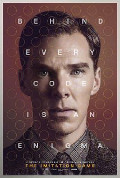
Directed by
Morten Tyldum
114 minutes
Rated M
Reviewed by
Sharon Hurst

The Imitation Game
Synopsis: Alan Turing (Benedict Cumberbatch) is considered the father of modern computing. This film variously examines his life from the late 1920s to the 1950s with particular emphasis upon his role throughout the Second World War in cracking Enigma, a German machine used to encrypt military messages.
This rewarding film is a fascinating story of a critical time in history and an enigmatic man who was much misunderstood in his day but who changed the face of the world as we know it today.
The structure of the film’s script by Graham Moore (based upon the book "Alan Turing: The Enigma" by Andrew Hodges), cleverly holds our attention by moving around in its time frame. So we meet Alan as a young school boy, bullied by his classmates but developing a special friendship with another sensitive lad who introduces Alan to the wonders of cryptology. Then it is 1939 and Alan heads to Bletchley Park in England, the epicentre of British wartime intelligence. There he joins a team of other code-breakers, and soon manages to get himself at the head of the project to crack the German code known as Enigma. To everyone’s horror he employs a woman, Joan Clarke (Keira Knightley), in the process sacking two of the less-than-remarkable male members of the team. Alan famously announces that it may take a machine to beat another machine and so begs to be allowed to build what is in essence a prototype computer to work tirelessly at cracking the code. The other time span we are taken to (in the opening scenes) is 1952, when the police are visiting Alan’s apartment after a robbery, a crucial event that leads to Alan's prosecution for homosexuality, deemed a crime in England until 1967. These periods come and go but the central thrust of the story looks at Alan’s tireless work and the race against time and his superiors’ scepticism.
At the film’s heart is a precise performance by Cumberbatch. He captures the strange anomaly that was this man - a maths genius in some ways self-assured and sometimes arrogant in his logical brilliance and in others cripplingly insecure and socially stilted, but above all absolutely committed to his invention. He is ably backed up by an excellent British cast. Knightley is surprisingly credible as the smart young woman who is willing to marry Alan in order to appease her parents and be allowed to stay on the project. Charles Dance is Commander Dennison, who runs Bletchley Park and is formidably anti-Alan, looking for any excuse to shut down the project. Always impressive, Matthew Goode is co-team member, Hugh Alexander, at odds and in competition with Alan from the outset. Rounding out the main cast is Mark Strong as Stewart Menzies, head of MI6.
The tonalities of the film’s look are predominantly sombre and costumes and locations and sets are flawlessly period whilst with the formidable machine that Alan builds is a compelling object central to many scenes. The gradual understanding we get of the German’s Enigma machine and of Alan’s theories of how to outwit it are fascinating and the film brings to light just how critical this man’s work was in saving lives and ending the war, not to mention effectively being the father of the modern computer.
Norwegian director Tyldum does a sterling job of interweaving important and fascinating historical facts with an intensely personal story with the result that, all up, The Imitation Game is a winner.

Want more about this film?


Want something different?




